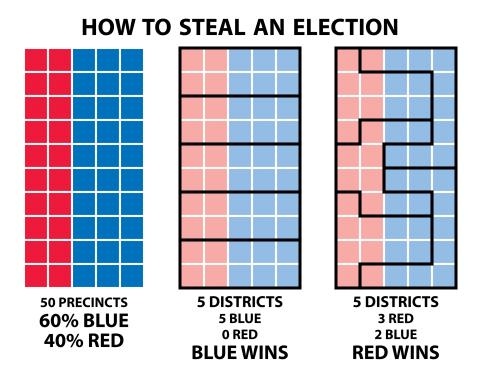Share
Blue Wave Recap: The Fight Against Gerrymandering

The Blue Wave on November 6, 2018 included so much good news it was difficult to process it all. Over the next few weeks, Smart Dissent will attempt to recap the progress we made together including well-publicized topics and less covered ones.
Our fourth post focuses on critical wins in the fight against gerrymandering which is ruining our representative democracy. Combing this with Monday's post, the Blue Wave was a major step forward for voting rights.
Tuesday brought wins for independent redistricting commissions.... in three of the four states where they were on the ballot—Michigan, Missouri, and Colorado, with Utah still counting....
With Tuesday’s ballot questions, now nearly one-third of House districts will be drawn through independent redistricting, by commission or other methods.
Let's take a moment to explain what this is about.
In most states, legislatures redraw the voting districts after every census—often to their own advantage, in a process known as partisan gerrymandering. Opponents argue that this type of redistricting deprives voters of their rights—and, in previous election years, it may also have deprived the Democrats of a few key victories.
A 2017 Brennan Center for Justice report found that up to 17 Republicans in Congress owed their seats to "extreme partisan bias" in district maps.
In a bid to take this responsibility away from parties in power, four states put redistricting on the ballot. Each citizen-led ballot initiative would create some form of commission or place restrictions on the redistricting process, which could affect the next round of redistricting after the 2020 census.
Here's how these measures did in three states:
Michigan: Passed
Overwhelmingly supported a constitutional amendment that will create an independent citizen redistricting commission to redraw both the legislative and congressional districts. The non-partisan grassroots organization Voters Not Politicians gathered 425,000 signatures to bring Proposal 2 to the ballot in an attempt to reverse partisan gerrymandering in Michigan, which has allowed Republicans to push a far-right legislative agenda in all three branches of government. Under the proposal, a bipartisan, 13-member commission—made up of four Democrats, four Republicans, and five Independents—must vote with a majority to approve the state's redistricting plans. The new boundaries will then be subject to public comment.
Colorado: Passed
Voters passed two measures, putting separate independent commissions in charge of state and congressional redistricting. Under Amendment Y, a 12-member bipartisan commission will take the role of redistricting from the General Assembly—and out from the governor's veto. The amendment will also require new boundaries to be "competitive," meaning that the newly drawn districts must have "a reasonable potential for the party affiliation of the district's representative to change at least once" every census. In a similar vote, Amendment Z will create a commission to redraw the state legislative maps.
Missouri: Passed
Amendment 1 passed with "landslide approval," according to KMOV. Unlike the other redistricting measures on the ballot this year, the state's new amendment will appoint a "non-partisan state demographer" to draw state legislative districts, subject to the legislative commission's approval. It will also require Missouri to use a statistical test to ensure fairness, making it one of the first states in the country to do so, according to the Brennan Center. Other aspects of the amendment are aimed at reducing the influence of lobbying in elections.
Arnold Schwarzenegger has throw his full support and efforts behind the fight against gerrymandering including these four ballot initiatives last week.
Now the former California governor has begun planning a summit for advocates, donors, and the people behind some of the successful campaigns to brainstorm and build to more wins.
Schwarzenegger became obsessed with redistricting reform after successfully pushing a ballot initiative in California, which passed narrowly in 2010.... At the time, California was one of only a handful of states that did this...
After the four ballot questions Tuesday and the federal judge who on Wednesday threw out the Maryland congressional map on grounds that they violated the Constitution through excessive partisanship, Schwarzenegger said he sees “a wave” of its own, albeit one that most election coverage has missed.
Sources:
https://psmag.com/news/how-did-citizen-led-redistricting-initiatives-fare-in-the-mid-terms
